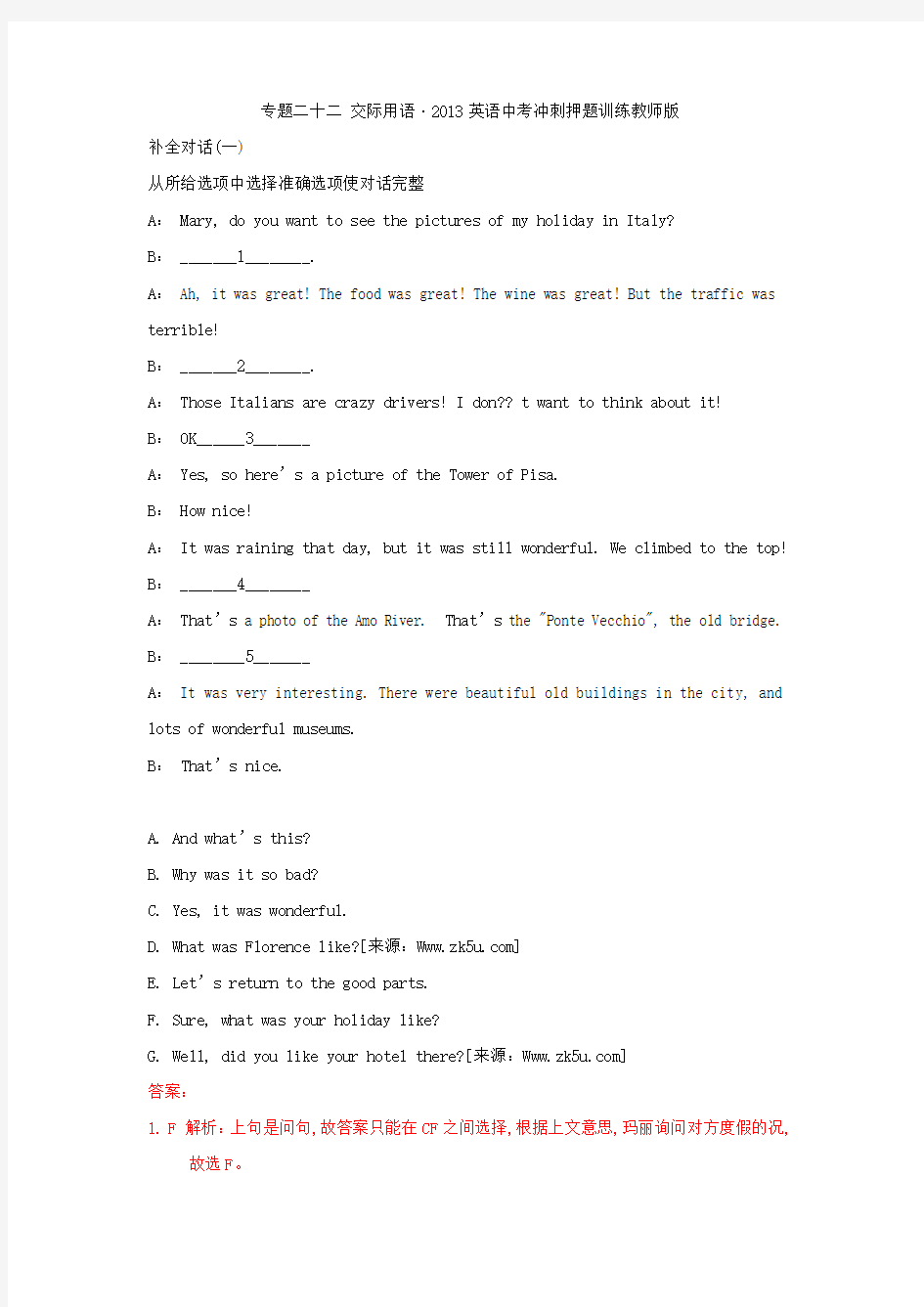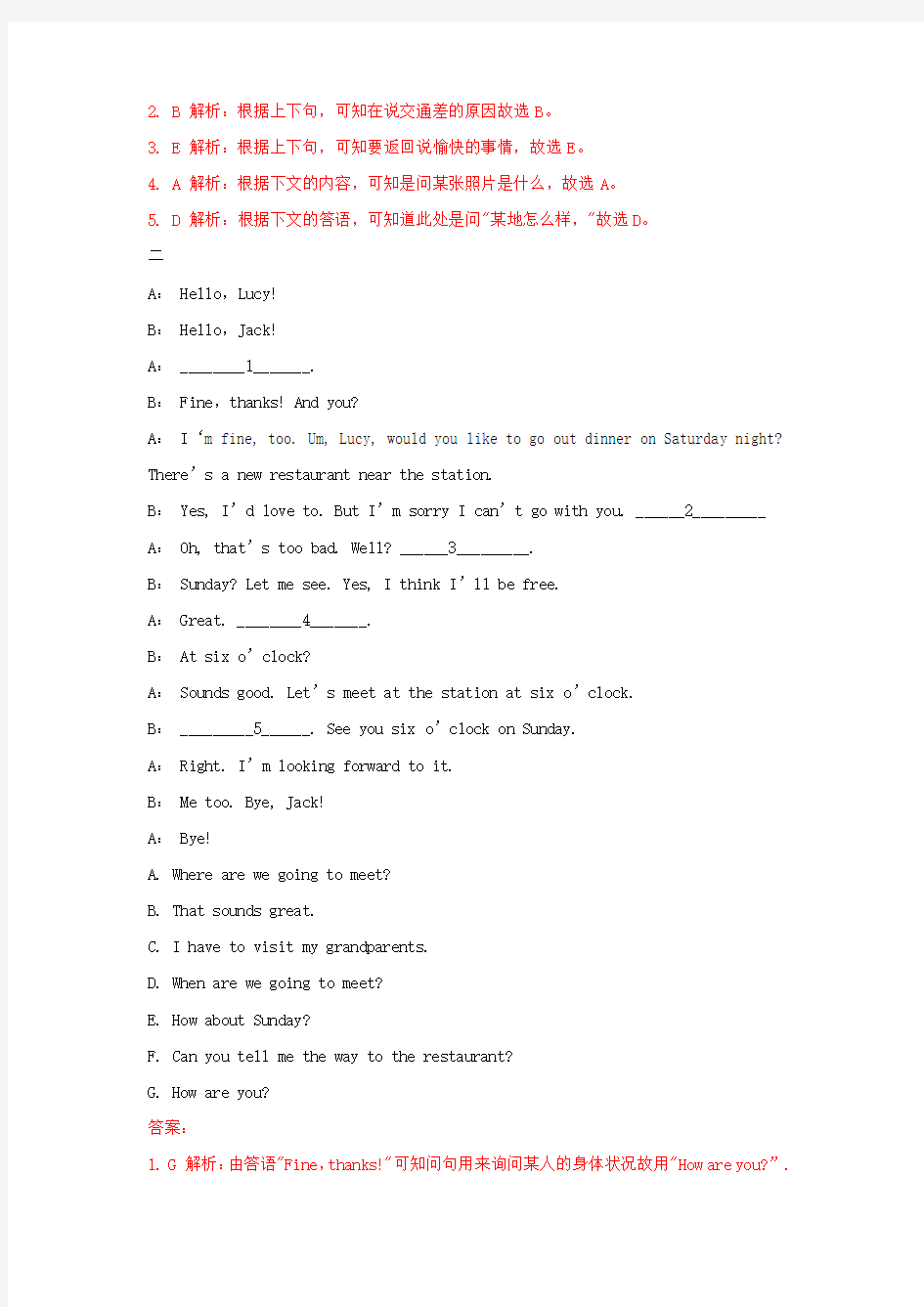

专题二十二交际用语·2013英语中考冲刺押题训练教师版
补全对话(一)
从所给选项中选择准确选项使对话完整
A: Mary, do you want to see the pictures of my holiday in Italy?
B: _______1________.
A: Ah, it was great! The food was great! The wine was great! But the traffic was terrible!
B: _______2________.
A: Those Italians are crazy drivers! I don?? t want to think about it!
B: OK______3_______
A: Yes, so here’s a picture of the Tower of Pisa.
B: How nice!
A: It was raining that day, but it was still wonderful. We climbed to the top! B: _______4________
A: Th at’s a photo of the Amo River. That’s the "Ponte Vecchio", the old bridge. B: ________5_______
A: It was very interesting. There were beautiful old buildings in the city, and lots of wonderful museums.
B:That’s nice.
A. And what’s this?
B. Why was it so bad?
C. Yes, it was wonderful.
D. What was Florence like?[来源:https://www.doczj.com/doc/923013753.html,]
E. Let’s return to the good parts.
F. Sure, what was your holiday like?
G. Well, did you like your hotel there?[来源:https://www.doczj.com/doc/923013753.html,]
答案:
1. F 解析:上句是问句,故答案只能在CF之间选择,根据上文意思,玛丽询问对方度假的况,
故选F。
2. B 解析:根据上下句,可知在说交通差的原因故选B。
3. E 解析:根据上下句,可知要返回说愉快的事情,故选E。
4. A 解析:根据下文的内容,可知是问某张照片是什么,故选A。
5. D 解析:根据下文的答语,可知道此处是问"某地怎么样,"故选D。
二
A: Hello,Lucy!
B: Hello,Jack!
A: ________1_______.
B: Fine,thanks! And you?
A: I‘m fine, too. Um, Lucy, would you like to go out dinner on Saturday night? There’s a new restaurant near the station.
B: Yes, I’d love to. But I’m sorry I can’t go with you. ______2_________ A: Oh, that’s too bad. Well? ______3_________.
B: Sunday? Let me see. Yes, I think I’ll be free.
A: Great. ________4_______.
B: At six o’clock?
A: Sounds good. Let’s meet at the station at six o’clock.
B: _________5______. See you six o’clock on Sunday.
A: Right. I’m looking forward to it.
B: Me too. Bye, Jack!
A: Bye!
A. Where are we going to meet?
B. That sounds great.
C. I have to visit my grandparents.
D. When are we going to meet?
E. How about Sunday?
F. Can you tell me the way to the restaurant?
G. How are you?
答案:
1. G 解析:由答语"Fine,thanks!"可知问句用来询问某人的身体状况故用"How are you?”.
2. C 解析:由"I’m sorry I can’t. . . "可知此处说明拒绝对方请求的理由.
3. E 解析:由答语"Sunday"可知此处用于询问"星期天怎么样?"故选E
4. D 解析:由答语"At six o’clock?"可知问句用于提问聚会的时间故用疑问词when 实
行提问?答案为D?
5. B 解析:问句Let’s.. . 用于征求对方的意见或建议,其答语常用"Good idea. / That
sounds good. "作答,故选B.
三
A: Excuse me, can you tell me where the nearest restaurant is?
B: _______1________.
A: Where is the nearest restaurant, please?
B: Oh, the restaurant? The nearest one is the City Restaurant. _______2________. A:I’m—er—I’m afraid I don’t quite. . . you see? _______3________.
B:I see. Simply walk two blocks straight ahead, then turn left, and the City Restaurant is about 10 metres ahead. _________4_____.
A: Can I take a bus?
B: Of course you can. But_______5________. It’s only a few minutes’ walk.
A: Thank you very much.
B: Not at all.[来源:https://www.doczj.com/doc/923013753.html,]
A. What did you say?
B. I’m a total stranger here.
C. You can’t miss it.
D. I beg your pardon?
E. It’s just opposite the Department Store.
F. I don’t think it is necessary.
G. It’s not very far.
答案:
1. D 解析:从此空上下两句的内容能够看出下句重复了上句的内容,注意:从含义上看似乎
选A 也行,但从交际的得体性来看,却不能选A(因为选它不礼貌).
2. E 解析:对话中一方要想找the nearest restaurant, 另一方告诉他"The nearest one
is the City Restaurant. " 接下来要说明的显然应是其具体位置,故选E.
3. B 解析:上文对方已将the nearest restaurant 的具体位置说得清清楚楚,而这位问路
人还是吞吞吐吐地说"I’m-er-I’m afraid I don’t quite . . . "这说明他对此地很不熟悉故选B
4. C 解析:这是在为别人指路时的常用语,其意有二:一是因为自己把对方要找的地方已介
绍得一清二楚,估计对方不会找不到?二是结束自己的"引路"
5. F 解析:问路人问"Can I take a bus?"对方先是肯定地回答说:"Of course you can"
但接着他又用but 来转折,从逻辑上讲but 后面的内容大概应该是"不乘车"之类的意思.再联系下的"It’s only a few minutes’walk. "此空选F 就很显然了.
补全对话(二)
在对话空白处填入一个适当的语句,使对话完整.
一
A:What’s your _______1_______, Madam?
B:I feel very weak. I can _______2________do any work, doctor.
A: How long have you been like this?
B: Ever________3_______ last month.
A: Have you got a headache?
B: No.
A: Do you usually________4_______.well at night?
B: Yes.
A: Do you often eat______5_________?
B: No. I don’t often have breakfast. And I have a little food for lunch because I want to _________6______ thin.
A: Oh, I see. There’s nothing ______7_________. You _______8_______to take much food and three _____9_____ a day. And do some _______10_______ every day. Then you’ll get better soon.
答案:
1. trouble 解析:询问病情时可讲:What’s the matter( with you )? / What’s the
trouble with. . . ?/ What’s wrong with. . . ? / Is there anything wrong
( the matter)with. . . ? / Are you feeling well (all right)?
2. hardly 解析:因为病人感到身体虚弱, 所以她几乎不能工作此处应填hardly.
3. since 解析:病人的状况自上个月以来一直这样,故应填since.
4. sleep 解析:此句医生问她晚上是否安睡,故应填sleep.
5. much 解析:此句医生在问病人的饮食情况,需填much
6. keep 解析:病人告诉医生她想要减肥,保持苗条?应填keep.
7. serious 解析:医生得知情况后,得出病情不严重,故填serious.
8. need 解析:此空为医生的建议可填need
9. meals 解析:医生建议她每天吃三餐饭应填meals
10.exercise 解析:建议其每天做操,可填exercise.
二
(Jenny and Nancy meet on the street)J = Jenny, N = Nancy
J: Hello, Nancy. ________1_______
N: Fine, thanks, Jenny.
J: I heard you went somewhere for vacation. ________2_______
N: Well, I have been to Hainan Island with my cousins. There are too many exciting things there, especially diving(潜水) in the real sea!
J: _______3________.! My parents and I will go there, too. What should we take? N: A camera, sunglasses, umbrellas and some cool clothes.
J: OK. Thank you. ______4_________.
N: You can get there by plane. Because it’s too far away, _______5________. J: Thank you! I think we surely will!
答案:
1. How are you 解析:由答语可知问用于询问某人的身体状况,故用"How are you?"提问.
2. Where have you been 解析:由答语"I have been to. . . "可知问句用于询问"你去哪儿了啊?"
3. That’s great/ That sounds great/ How interesting/ wonderful/nice 解析:对上
句提到的事情叫好? "That’s great. " 意为"太好了".
4. How can we get there 解析:由答语中的"by plane"可知,问句用于提问交通方式?故用疑问词how 实行提问.
5. Have a good trip/ Enjoy yourself/ I hope you’ll have a good vacation 解析:某人旅行前常用"Have a good trip. "表示祝福.
三
A: Hi, Peter! How are you today?
B: ________1_______, And you?
A:I’m OK. Are you free tomorrow?
B: _________2______
A:We’re going to the park. ______3_________.
B: Of course. I’d like to go with you.______4_________.
A: We are going to meet at the school gate at one o’clock.Please be there on time. B: OK. Thank you.
答案:
1. Fine, (I’m fine) thank you 解析:应该是回答对方的问话"How are you today?"的答语.
2. Yes, why/ Yes, what’s up 解析:紧接问句"Are you free tomorrow?" 根据整个谈话的内容判断,应回答"Yes, why? /Yes, what’s up?"
3. Would you like to go with us/ Will you go with us 解析:因为句末是问号?其答语是:"Of course. I’d like to go with you. " 由此我们判断?对方是在邀请他一起到公园去.
4. When and where are we going to meet/ When and where shall we meet 解析:此空又是一个问句?其答语是:"We are going to meet at the school gate at one o’clock. Please be thereon time. " 由此我们判断对方问的是见面的时间和地点.
情景选择
1. —Would you like to have dinner with us this Sunday, Miss Wang?
—_______________.
A. Oh, no, let’s not
B. I’d love to, but I have some other things to do
C. No, I don’t want to go
D. Oh, no, that’ll be too much trouble
答案:B
解析:"———王小姐,这个周日能和我们共进晚餐吗? ———我乐意,但我还有其他的事情要做."拒绝别人的邀请时语气要委婉.B 项表示"我乐意?但我还有其他的事情要做"。A 项表示"不,不要了",C 项表示"不,我不想去"表达太生硬D 项表示"不,那太麻烦了"。
2. —Do you think the sports meeting will be put off because of the heavy rain? —_______________. My left leg was hurt badly just now, you know.
A. I hope so
BI hope not
C. I can’t believe you
D. I’m sorry to hear that
答案:A
解析: "———你认为运动会会因为大雨而延期吗? ———我希望这样,你知道我的左腿刚才受伤很严重。"根据答语第二句可知表示想让运动会延期。B 项表示"不希望延期"C 项表示"我不相信"D 项表示"听到这个消息感到很难过"
3. —Could you tell me how to get to railway station, please?
—_______________.
A. No, I couldn’t
B. Don’t ask me
C. Thank you all the same
答案:D
解析:"———能告诉我怎样去火车站吗? ———当然,你能够乘1 路公交车"。询问去火车站的路,回答表示地点方位。
D. Certainly. You can take the No 1 bus
4. —How much meat do you want?
— .
A. Sorry, there isn’t any
B. I can’t give you any
C. Half a kilo, please
D. Twelve yuan a kilo
答案:C
解析:"———你想要多少肉? ———请给我半斤。"询问多少肉应该回答数量 A 项表示"
没有多少了"B 项表示"不能给你"D 项表示"1 斤12 元"[来源:中.考.资.源.网]
5. —Lucy, let me help you fix your computer.
—_______________.I can do it myself.
A. Never mind
B. No, thanks
C. Sorry, I can’t
D. Not at all
答案:B
解析:"———露西,让我帮你修理电脑吧? ———不用,谢谢。我自己能够修理"A 表示接受别人的道歉,意为"没关系"C 项表示可能不需要D 项表示接受别人的道歉。
6. —Would you mind planting the trees for me?
—_______________. I have to go to work.
A. Never mind
B. No, please
C. Sorry, I can’t
D. Not at all
答案:C
解析:"———你介意为我种树吗? ———抱歉,我不能。我得去上班。"根据答语第二可知,选C表示不能做某事?A 项表示接受别人道歉"没关系"B 项表示"请不要这样做"D 项表示接受别人的道歉。
7. —Can you go to the movie with me?
—_______________but I haven’t finished my homework yet.
A. I’d love to
B. No, he isn’t
C. I hope so
D. I’m afraid so
答案:A
解析:"———你能跟我一起去看电影吗? ———我想去,但我还没完成作业。"所以想不能去,其他项不符合题意。
8. —Is Mr. Smith really very ill?
—_______________.He’s in hospital.
A. I don’t think so
B. No, he isn’t
C. I hope so
D. I’m afraid so
答案:D
解析:"———史密斯先生病得很严重吗? ———恐怕是的,他在住院"根据答语的第二句"He ‘s in hospital"可知选D。
9. —Peter, don’t step on the grass.
—_______________.
A. It doesn’t matter
B. I can’ t do it
C. Don’t worry
D. Sorry, I won’t do it again
答案:D
解析:"———彼得,不要踩在草坪上。———抱歉,我不会再那样做了"A 项表示接受别人的道歉B 项表示"我不会做"C 项表示"别担心"。
10. —Hi, Emma. The math test is coming. I’m sure I’ll pass it.
—_______________.
A. Impossible![来源:https://www.doczj.com/doc/923013753.html,]
B. Good luck!
C. Sorry.
D. Why not?
答案:B
解析:"———嗨,艾玛,数学考试就要到了,我肯定会通过考试。———祝你好运!"B 项表示"祝你好运" A 项表示"不可能"C 项表示"道歉"D 项表示"为什么不"。
11. —How do you like the TV play?
—_______________.
A. It’s wonderful.
B. What about you?
C. Yes, I like it.
D. No, I don’t like it at all.
答案:A
解析:"———你觉得电视节目怎么样? ———很棒!"A 项表示"很棒"B 项表示"你"C 项表示"是的我喜欢"不用于回答特殊疑问句 D 项表示"不我一点也不喜欢"不用于回答特殊疑问句。[来源:https://www.doczj.com/doc/923013753.html,]
12. —Alice, you dance very well.
—_______________.
A. Not so well
B. That’s all right
C. Thank you
D. I agree with you
答案:C
解析:"———爱丽斯,你舞跳得很好。———谢谢。" 当受到别人称赞时,应该表示感谢。
13. —My sister has lost the chance to work in Guangzhou.
—_______________. !
A. Well done
B. Good luck
C. What a pity
D. Congratulations
答案:C
解析:"———我姐姐错失了去广州工作的机会。———太可惜了!"听到不好的消息应表示同情或遗憾C 项符合题意 A 项意为"干得好"B 项意为"祝你好运"D 项意为"祝贺你"。14. —How about going shopping on Hunan Road this evening?
—_______________, but I have to prepare for tomorrow’s exam.
A. I can’t
B. Sounds great
C. That’s right
D. No, I’m terrible
答案:B
解析:"———今天晚上去湖南路购物怎么样? ———听起来好极了,但是我得准备明天的考试" 由答句中的"but"表转折可判断,说话人认为那是个好主意,所以只能选B。
15. —Thank you for your help, Sarah.
—_______________.
A. Good idea
B. Please don’t say so
C. It doesn’t matter
D. You are welcome
答案:D
解析:"———萨拉,谢谢你的协助。———别客气,"回答"Thank you. "应用"You are welcome."意为"别客气""Good idea. "意为"好主意""Please don‘t say so. "意为"请别这样说""It doesn’t matter. "意为"没关系"。